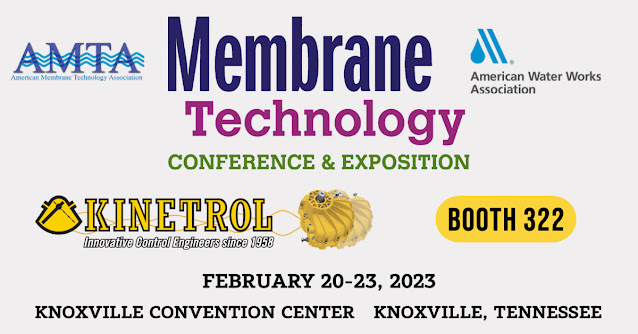The Kinetrol rotary vane design is based upon a single moving part which eliminates additional parts required to convert linear motion to rotary motion. This simple and innovative design provides a highly accurate and extremely reliable actuator for operating valves, drives and dampers, and is perfectly suited for the most demanding process control applications. For more information visit www.kinetrolusa.com or call 972-447-9443.
Kinetrol USA Exhibiting in 2023 AMTA/AWWA Membrane Technology Conference
Are Wastewater Treatment Plants the Key to Coronavirus Outbreak Early Warning?
Wastewater testing, or “wastewater quality indicators” are broad descriptions for the various test methodologies to measure water quality. These tests analyze the physical, chemical, and biological characteristics of wastewater.
As countries and individual healthcare organizations work to arrest the spread of Covid-19 and to care for those who are infected, officials in some geographic locations are using wastewater testing as a possible method for identifying levels of Covid-19 in their communities. The testing goal is to detect evidence of the Covid-19 genetic material, ribonucleic acid (RNA), in fecal matter in sewage and wastewater.
The novel virus, SARS-CoV-2, is the virus that causes Covid-19. It is known to invade the GI (gastrointestinal) track in some patients, and so the virus is extracted in their fecal matter.
Looking at the amount of viral matter in waste water from a community could uncover the level of Covid-19 spread in the population. This information can then be a trigger for the required mitigation initiatives and response plans, such as testing individuals, contract tracking, and quarantine. It also allows for information to be gathered on a cross section of the population, allowing for a way to monitor public health solutions for large groups.
 |
| Figure 1 |
Scientists from around the world are setting up pilot programs to test waste water. The Netherlands has successfully performed a Covid-19 test for waste water and additional programs are launching in Singapore, Zurich, Lausanne, Milan, Rome, Australia, and in parts of the US, such as Colorado, Ohio, New York, and Wyoming. Scientists in these regions have been able to identify the novel Coronavirus at low concentrations in waste water, pointing to an early warning systems for communities.
In April, 2020, the scientific journal, Nature, listed that over a dozen groups around the globe were doing research analyzing waste water for Covid-19, and that evidence of the virus was already found in the United States, the Netherlands, and Sweden.
Sampling and analysis of pre-treated sewage is key. The results of this analytical testing reveal the characteristics and presence of the Coronavirus in parts per million quantities, and can be laid against the population numbers of a geographic area to ascertain the existence and amount of virus existing in the wastewater. An example of this kind of data dump is illustrated in Figure 1 (courtesy of the Massachusetts Water Resource Authority and Biobot Analytics).
Article courtesy of Kinetrol USA.

